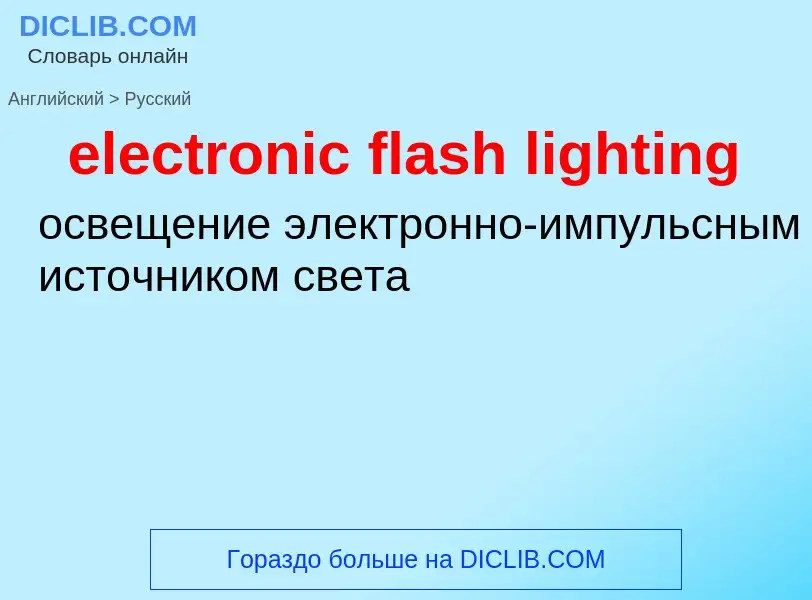Перевод и анализ слов искусственным интеллектом ChatGPT
На этой странице Вы можете получить подробный анализ слова или словосочетания, произведенный с помощью лучшей на сегодняшний день технологии искусственного интеллекта:
- как употребляется слово
- частота употребления
- используется оно чаще в устной или письменной речи
- варианты перевода слова
- примеры употребления (несколько фраз с переводом)
- этимология
electronic flash lighting - перевод на русский
['flæʃgʌn]
существительное
фотография
лампа для (магниевой) вспышки
«блиц»
лампа для (магниевой) вспышки, 'блиц'
['fəutə(u)flæʃ]
общая лексика
фотовспышка
существительное
фотография
лампа-вспышка
['flæʃi'limineitə]
военное дело
пламегаситель
['flæʃ'haidə]
синоним
общая лексика
температура вспышки
минералогия
точка возгорания
строительное дело
температура вспышки (воспламенения)
['flæʃlæmp]
общая лексика
лампа вспышка
синоним
Определение
Википедия

A flash is a device used in photography that produces a brief burst of light (typically lasting 1/1000 to 1/200 of a second) at a color temperature of about 5500 K to help illuminate a scene. A major purpose of a flash is to illuminate a dark scene. Other uses are capturing quickly moving objects or changing the quality of light. Flash refers either to the flash of light itself or to the electronic flash unit discharging the light. Most current flash units are electronic, having evolved from single-use flashbulbs and flammable powders. Modern cameras often activate flash units automatically.
Flash units are commonly built directly into a camera. Some cameras allow separate flash units to be mounted via a standardized accessory mount bracket (a hot shoe). In professional studio equipment, flashes may be large, standalone units, or studio strobes, powered by special battery packs or connected to mains power. They are either synchronized with the camera using a flash synchronization cable or radio signal, or are light-triggered, meaning that only one flash unit needs to be synchronized with the camera, and in turn triggers the other units, called slaves.


![Demonstration of a magnesium [[flash powder]] lamp from 1909 Demonstration of a magnesium [[flash powder]] lamp from 1909](https://commons.wikimedia.org/wiki/Special:FilePath/1909 Victor Flash Lamp.jpg?width=200)


![Kodak Brownie Hawkeye]] with "Kodalite Flasholder" and Sylvania P25 blue-dot daylight-type flashbulb Kodak Brownie Hawkeye]] with "Kodalite Flasholder" and Sylvania P25 blue-dot daylight-type flashbulb](https://commons.wikimedia.org/wiki/Special:FilePath/Brownie Hawkeye with Flash.jpg?width=200)
![A photo of a [[Smith & Wesson Model 686]] firing, taken with a high speed [[air-gap flash]]. The photo was taken in a darkened room, with camera's shutter open and the flash was triggered by the sound of the shot using a microphone. A photo of a [[Smith & Wesson Model 686]] firing, taken with a high speed [[air-gap flash]]. The photo was taken in a darkened room, with camera's shutter open and the flash was triggered by the sound of the shot using a microphone.](https://commons.wikimedia.org/wiki/Special:FilePath/Bullet coming from S&W.jpg?width=200)







![Pentax MZ-30]], firing Pentax MZ-30]], firing](https://commons.wikimedia.org/wiki/Special:FilePath/The built in flash of a SLR camera, Pentax MZ-30, firing 2.jpg?width=200)
![Flash LED with [[charge pump]] integrated circuit Flash LED with [[charge pump]] integrated circuit](https://commons.wikimedia.org/wiki/Special:FilePath/Wiko Rainbow 4G - Flash LED with SGM3140 LED Driver -5572.jpg?width=200)






.jpg?width=200)

![Automatic [[Pensky-Martens closed cup]] tester with an integrated fire extinguisher Automatic [[Pensky-Martens closed cup]] tester with an integrated fire extinguisher](https://commons.wikimedia.org/wiki/Special:FilePath/APM-932hd-1.png?width=200)



![Xenon flashtubes used on [[smartphone]]s and cameras are usually externally triggered. Xenon flashtubes used on [[smartphone]]s and cameras are usually externally triggered.](https://commons.wikimedia.org/wiki/Special:FilePath/Nokia N8 (rear view).jpg?width=200)
![This [[shadowgraph]] of a bullet in supersonic flight was taken at the Edgerton Center (Strobe Alley, MIT), using a discharge from a high-speed flashtube This [[shadowgraph]] of a bullet in supersonic flight was taken at the Edgerton Center (Strobe Alley, MIT), using a discharge from a high-speed flashtube](https://commons.wikimedia.org/wiki/Special:FilePath/Shockwave.jpg?width=200)

![Xenon, operated as a 'neon light,' consists of a collection of mostly spectral lines, missing much of the continuum radiation needed for good [[color rendering]]. Xenon, operated as a 'neon light,' consists of a collection of mostly spectral lines, missing much of the continuum radiation needed for good [[color rendering]].](https://commons.wikimedia.org/wiki/Special:FilePath/XeTube.jpg?width=200)


